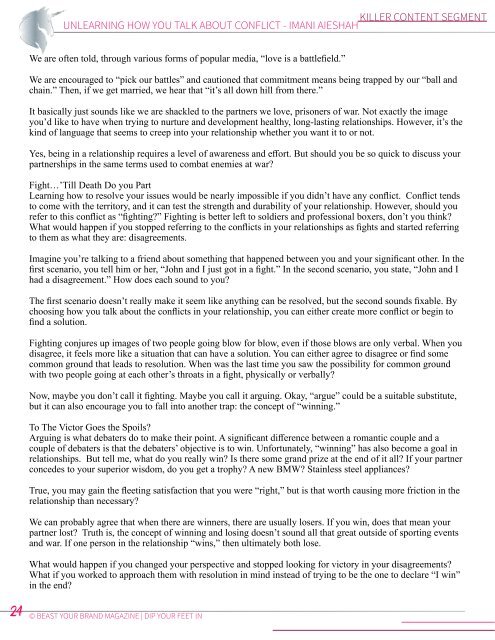BYB Mag - Dip Your Feet In
Branding doesn't have to be as hard as you think it is! Dip your feet in and enjoy the ride with this issue of the Beast Your Brand Mag!
Branding doesn't have to be as hard as you think it is! Dip your feet in and enjoy the ride with this issue of the Beast Your Brand Mag!
You also want an ePaper? Increase the reach of your titles
YUMPU automatically turns print PDFs into web optimized ePapers that Google loves.
KILLER CONTENT SEGMENT<br />
UNLEARNING HOW YOU TALK ABOUT CONFLICT - IMANI AIESHAH<br />
KILLER CONTENT SEGMENT<br />
UNLEARNING HOW YOU TALK ABOUT CONFLICT - IMANI AIESHAH<br />
We are often told, through various forms of popular media, “love is a battlefield.”<br />
We are encouraged to “pick our battles” and cautioned that commitment means being trapped by our “ball and<br />
chain.” Then, if we get married, we hear that “it’s all down hill from there.”<br />
It basically just sounds like we are shackled to the partners we love, prisoners of war. Not exactly the image<br />
you’d like to have when trying to nurture and development healthy, long-lasting relationships. However, it’s the<br />
kind of language that seems to creep into your relationship whether you want it to or not.<br />
Yes, being in a relationship requires a level of awareness and effort. But should you be so quick to discuss your<br />
partnerships in the same terms used to combat enemies at war?<br />
Fight…’Till Death Do you Part<br />
Learning how to resolve your issues would be nearly impossible if you didn’t have any conflict. Conflict tends<br />
to come with the territory, and it can test the strength and durability of your relationship. However, should you<br />
refer to this conflict as “fighting?” Fighting is better left to soldiers and professional boxers, don’t you think?<br />
What would happen if you stopped referring to the conflicts in your relationships as fights and started referring<br />
to them as what they are: disagreements.<br />
More simply, what if you called your conflicts disagreements instead of fights and stopped using the words that<br />
could quite easily be mistaken for military strategy?<br />
Saying something is “nice” is not the same as saying it is “fabulous,” right? The words you use carry weight,<br />
so don’t wield them like a sword. Use them to connect to what you really want: a healthy relationship that feels<br />
good to you!<br />
If you can use your words to perceive conflict differently with your partner, you may just find you have less<br />
conflict and more time to enjoy each other. If you’re trying to work with your partner to create an amazing relationship,<br />
you don’t want to speak to him or her as an enemy of war whenever there is conflict. So, next time you<br />
and your partner disagree, take off the armor and back away from the frontline.<br />
Save<br />
Imagine you’re talking to a friend about something that happened between you and your significant other. <strong>In</strong> the<br />
first scenario, you tell him or her, “John and I just got in a fight.” <strong>In</strong> the second scenario, you state, “John and I<br />
had a disagreement.” How does each sound to you?<br />
The first scenario doesn’t really make it seem like anything can be resolved, but the second sounds fixable. By<br />
choosing how you talk about the conflicts in your relationship, you can either create more conflict or begin to<br />
find a solution.<br />
Fighting conjures up images of two people going blow for blow, even if those blows are only verbal. When you<br />
disagree, it feels more like a situation that can have a solution. You can either agree to disagree or find some<br />
common ground that leads to resolution. When was the last time you saw the possibility for common ground<br />
with two people going at each other’s throats in a fight, physically or verbally?<br />
Now, maybe you don’t call it fighting. Maybe you call it arguing. Okay, “argue” could be a suitable substitute,<br />
but it can also encourage you to fall into another trap: the concept of “winning.”<br />
To The Victor Goes the Spoils?<br />
Arguing is what debaters do to make their point. A significant difference between a romantic couple and a<br />
couple of debaters is that the debaters’ objective is to win. Unfortunately, “winning” has also become a goal in<br />
relationships. But tell me, what do you really win? Is there some grand prize at the end of it all? If your partner<br />
concedes to your superior wisdom, do you get a trophy? A new BMW? Stainless steel appliances?<br />
True, you may gain the fleeting satisfaction that you were “right,” but is that worth causing more friction in the<br />
relationship than necessary?<br />
We can probably agree that when there are winners, there are usually losers. If you win, does that mean your<br />
partner lost? Truth is, the concept of winning and losing doesn’t sound all that great outside of sporting events<br />
and war. If one person in the relationship “wins,” then ultimately both lose.<br />
What would happen if you changed your perspective and stopped looking for victory in your disagreements?<br />
What if you worked to approach them with resolution in mind instead of trying to be the one to declare “I win”<br />
in the end?<br />
24 © BEAST YOUR BRAND MAGAZINE | DIP YOUR FEET IN © BEAST YOUR BRAND MAGAZINE | DIP YOUR FEET IN 25


